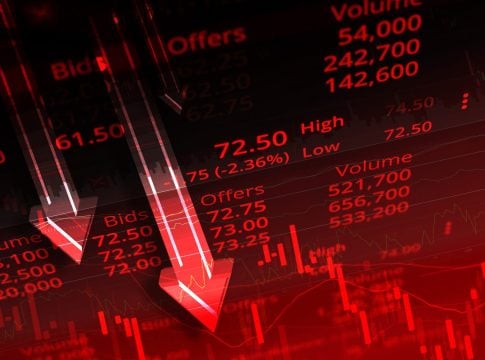What should Greece fear next year? Nothing. And everything. Because Greece has left behind the years of painful crisis and memoranda, is following a stable course and has at its disposal the tools required to face any geopolitical and economic problems that may arise.
However, there are also some persistent issues that it cannot ignore such as the current account deficit, the investment gap, and the low GDP per capita.
Despite these issues, Greece can feel proud that it is no longer a source of concern for the Eurozone. On the contrary, it is considered by many as a model country.
Samuel Tilleray, credit analyst at S&P Global Ratings, Greg Kiss, Director of Fitch’s Sovereign analytical team, and Dennis Shen, Chair of the Macroeconomic Council and primary sovereign analyst at Scope Ratings, give credit for what Greece has achieved, but they also sound the alarm.
Model Country
Greg Kiss (Fitch) underlined that Greece maintains a stable economic path, with projected growth rates of 2.0-2.5% in the coming years. The absorption of the funds from the Recovery Fund and increased investments are the main pillars of economic resilience.
Samuel Tilleray (S&P) estimated that the country’s economic momentum will be maintained, driven by investments and private consumption, with the average growth rate at 2.5% for the period 2025-2027. He also sees continued fiscal consolidation, with the net debt-to-GDP ratio expected to continue to decline to 119% of GDP by 2027, from 192% in 2020.
Dennis Shen (Scope Ratings) referred to the improvement in Greece’s credibility in the markets, with the recovery of investment grade being an important milestone. The strengthening of investor confidence is giving impetus to infrastructure and innovation projects, underlining the transition to “Greece 2.0.” It is no coincidence, as he pointed out, that Greek bonds acted as a “safe haven” when the political crisis broke out in France.
The persistent problems
Despite the overall progress, Samuel Tilleray emphasized that Greece still faces challenges, such as the high current account deficit, which remains at 6% of GDP. This makes the economy vulnerable to fluctuations in international trade and changes in energy prices, he explained.
Greg Kiss noted that the country remains vulnerable to external pressures, especially if there are increases in energy prices or geopolitical tensions. He added that improving productivity is crucial to increasing GDP per capita, which is below the European average. The need for strategic investments and reforms remains imperative, he noted. On his part, Dennis Shen stated that competitiveness is still a challenge.
The future of the Greek economy
Greece can be optimistic, as it is no longer a “weak link” in the Eurozone. As Dennis Shen noted, the country has shown resilience in recent international crises, which reflects progress in fiscal policy and institutional reforms.
Samuel Tilleray underlined that Greece must continue to focus on innovation and attracting investment in order to maintain its momentum, while Kiss agreed that the country now has the means to face external challenges, provided it does not become complacent.
However, all of them agree on the two challenges that need to be urgently addressed: climate change and the aging of the population.
Fitch Ratings
Greg Kiss – Director – Sovereign analytical team
Our baseline scenario is that modest growth will continue in Greece in 2025 and 2026. The GDP growth rate will be around 2-2.5%, similar to 2024 and 2023 – supported by a steady acceleration in investments and moderate consumption growth, underpinned by real-wage increases and a further fall in unemployment.
Given the deep legacy burdens from the debt crisis it is important that the EU’s Recovery and Resilience Facility has significantly supported investments. Greece has one of the highest absorption rates of the grant component among EU members. We also expect some positive spillovers from these projects to growth potential, through private investments.
The prudent fiscal stance and credible fiscal framework are relevant rating strengths of Greece. We expect the government’s sound fiscal policy to continue in 2025-2026. Greece achieved a strong fiscal position following the Covid-19 pandemic and energy shocks, with an estimated budget deficit below 1% of GDP in 2024. Improving tax collection boosts revenue, and expenditure is under the government’s tight control. We forecast the primary budget surplus to stay above 2% of the GDP until at least 2026.
The combination of steady primary surpluses, low and stable interest costs and nominal GDP growth of about 4% will ensure a continued decline of the debt-to-GDP ratio, albeit from a very high level. These strengths can also serve as a buffer in case of adverse shocks, like geopolitical tensions or global trade war hits Greece.
The external finances are an area of concern, a direct vulnerability to potential external shocks. The current account deficit was more than 6% of GDP in 2023, significantly higher most rating peers. The deficit narrowed in 2023 due to lower commodity prices from its 2022 peak, but the improving trend has not continued in 1H24. Nevertheless eurozone membership mitigates external financing risks.
Scope Ratings
Dennis Shen – Senior Director ‑ Sovereign & Public Sector
We believe Greece has made substantive progress in entering so-called Greece 2.0, moving towards book-ending the multiple crises since 2009. This has been supported by the fundamental reforms of the economy and investments of the more than a decade since the Greek crisis. Institutional advancements such as greater EU fiscal union and ECB innovations strengthening Eurosystem lender-of-last-resort functionalities have also helped.
Regaining the investment-grade status last year from Scope and other major credit rating agencies and Greece’s improved relations with European institutions in recent years also make the economy and financial system more resilient to sudden crises, whether of domestic or international provenance. This has on the aggregate made Greece better prepared for the challenges 2025 might have in store.
As an example, the fundamental improvements and the enhancements of ECB tools have made Greece more resilient to any re-rise of borrowing rates regionally from the further risk re-appraisal of euro-area or global sovereign debt sustainability. During the recent sell-off of French sovereign debt, Greek government securities behaved at moments akin to a financial safe haven. Such increased confidence from international investors in Greece and greater resilience during the phases of capital-market stress would not have been possible absent Greece 2.0.
Greece is also more resilient to trade conflicts because of the strengthened economy. Greece is more open today than it was before the Greek crisis, so there is certainly more adverse economic exposure than before if global trade slows because of forthcoming tariffs and counter-tariffs. Nevertheless, the limited direct trade of Greece with the US economy, the sturdy momentum of the economy entering 2025 and continued EU funding support for Greece during the coming years anchor a degree of economic resilience against trade-related challenges. This resilience also holds for the economic consequences of any flaring up of geopolitical tensions, such as in the Middle East and/or the Ukraine war.
Standard & Poor’s
Samuel Tilleray, credit analyst
Greece’s economy is well-placed to navigate the challenges ahead, despite global uncertainties and some lingering external vulnerabilities. We expect the country’s economic momentum to be maintained, driven by investment and private consumption, with a growth forecast to average 2.5% over 2025-2027. Additionally, the government’s budgetary consolidation efforts have improved fiscal buffers, with the net government debt-to-GDP ratio expected to continue shrinking to 119% of GDP by 2027, down from a peak of 192% in 2020.
However, Greece’s current account deficit remains elevated, coming to 6.5% of GDP in 2023. This disproportionately exposes the country to external financing risks, particularly in scenarios where oil prices spike, which remains possible as geopolitical risks are currently high. Similarly, Greece’s potentially for export driven recovery will become more difficult if a new wave of trade-wars breaks out, even if not all sectors are directly impacted – because Greece is still very exposed to growth in Europe more generally.
Longer term, Greece is only likely to be able to resolve its external imbalances by boosting competitiveness. We note that such structural reforms remain central to the current government’s policy agenda.
Greece’s other two serious long-term challenges stem from its aging society and climate shocks, and these areas are likely to occupy significant policy space for future Greek governments too.
An aging, significant work taken by past governments to reform the pension system has significantly curbed the fiscal risk to the government from the country’s demographic shift (one of the most intense globally). Moreover, the recent trend of increased employment among older groups and women is encouraging and may help to limit the economic impact of the aging society.
Climate shocks are also becoming an increasingly relevant aspect to consider in Greece, with several tragic incidents in recent years. Still, from a purely credit risk viewpoint, the fiscal and economic impacts so far appear manageable.















